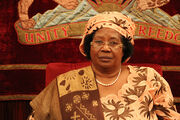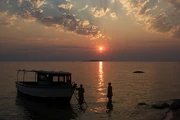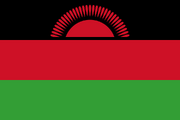Even though it is part of the 1983: Doomsday Timeline, its creator or creators have more work to do before it can be complete. You are welcome to give suggestions at the Talk Page. |
Unity and Freedom | |||
| Anthem | "Mulungu dalitsa Malaŵi (Chichewa)
"Oh God Bless Our Land of Malawi" | ||
| Capital | Lilongwe | ||
| Largest city | Lilongwe | ||
| Other cities | Blantyre, Zomba, Mzuzu, Limbe | ||
| Language | English Chichewa | ||
| Ethnic Group | Chewa 32.6%
Lomwe 17.6% Yao 13.5% Ngoni 11.5% Tumbuka 8.8% Nyanja 5.8% Sena 3.6% Tonga 2.1% Ngonde 1% other 3.5% | ||
| Government | Unitary presidential republic | ||
| Legislature | National Assembly | ||
| President | Joyce Mtila | ||
| Vice President | Khumbo Kkwacha | ||
| Area | 118,484 km² | ||
| Population | 12501,000 | ||
| Established | From UK : 6th July 1964 | ||
| Currency | Kwacha | ||
The Republic of Malawi is a land-locked country in southeast Africa. It suffered a devastating civil war during the late 80's and early 90’s, but the situation in Malawi is slowly but surely improving.
History[]
Pre Doomsday[]
Malwi was the former British colony of Nyasaland. It gained independence in 1964 with Hastings Banda as president for life.
Post-Doomsday[]
After Doomsday, Hastings Banda managed to keep order for about four years. However, Hasting’s popularity started to drop due to a cessation of trade, food shortages, and because he started growing increasingly paranoid and started violently cracking down on the restless public. This paranoia also caused Hastings to execute several of his own ministers. In June of 1987, a group of disgruntled citizens held a protest when Hastings Banda gave a speech. The protest turned violent and Hastings Banda was killed in the crossfire. Due to the fact Hastings had most of his top ministers executed, Hastings had no strong successor. Thus, Malawi was left with a weak government and a civil war ignited in late July.
Malawian Civil War[]
Despite the effort Hastings Banda put in to stamping out potential dissidents, an underground resistance called the Alliance for Democracy had formed. During the Malawian civil war, the Alliance for Democracy was the strongest and most organized faction fighting for control of Malawi. It still took about 7 years before the alliance had completely seized control of the country and, a lawyer named Bazuka Mhango had been elected as the first president of a new multiparty government.
The Mhango Administration[]
In the aftermath of the civil war Malawi was in shambles. Most of the nation’s infrastructure was destroyed, the economy was in ruins, and the body count was high. Thus, President Mhango had his work cut out for him. President Mhango managed to gain re-election because he managed to increase agriculture output, repair a small amount of infrastructure, improve Malawi’s floundering education system, and keep order without being overly brutal. In Mhango’s second term radio service was restored to Malawi.
President Thindwa[]
Mhango was succeeded by Dr. Kenneth Thindwa. His presidency was marked by government incentives and subsidies for small businesses. These actions lead to a small boom in cottage industries like furniture making and tailoring. Despite the modest upturn in the economy Dr. Kenneth Thindwa barely loss the election of 2009 to his former foreign minister Joyce Mtila.
The Mtila Era[]
Malawi is still a poor land, but things are getting better. Under President Mtila women’s rights have improved. Also ties with Zambia, Mozambique and North Zimbabwe have been strengthened. There has also been some more progress made in educational reform.

Politics[]
Major parties include the Alliance for Democracy (Center Left), the People’s Party,(Center Right) and the Republcian Front (Center) and the. Malawi is also the center of a movement to form a Bantu federation called the Mutapa Coalition. This movement’s political arm is the Coalition Party. The Coalition Party has three seats in National Assembly.
Military[]
Malawi has a small military of approximately 3,000. In an emergency, it can summon up to 5,000, but cannot arm them all.
Economy[]
Malawi is a poor country heavily dependent on agriculture. Tobacco, tea, and Tilapia are its main exports. Fishing on Lake Malawi has proven to be a lucertive industry. Malawi has developed a system of workshops, which produce products like hand craved furniture and hand woven clothing. These workshops mainly produce products for the domestic market, but a tiny portion of Malawian workshops products are exported to Zambia and Mozambique

International Relations[]
Malawi has very close relations with Zambia and Zimbabwe. Malawi also has embassies with New Britain, Mozambique,South Zimbabwe,Katanga ,the Republic of Angola,s and several of the Tanzanian breakaway states.

